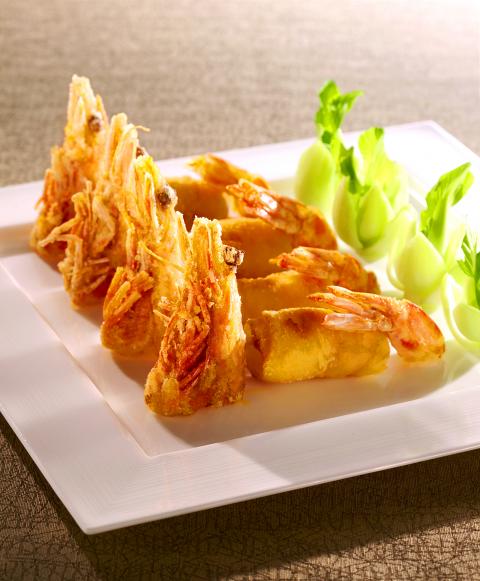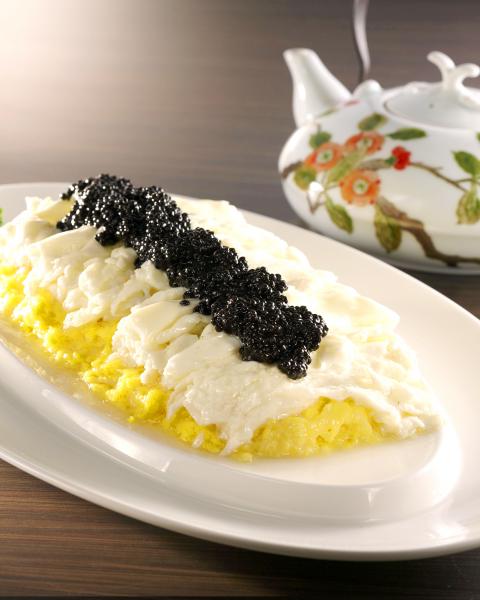Michelin stars are all the rage these days, and there is scarcely a top-ranking hotel in Taipei that has not splashed out to bring starred European chefs over to display their skills and give the kitchen teams a sharper edge. While the stars of the recently introduced Michelin guides to Asia’s restaurants might not have the same luster as the Gallic ones, they still manage to put a shine on a restaurant’s reputation among serious foodies looking for something a little more creative than shark fin soup.
After two of Shangri-la’s Hong Kong hotel restaurants were awarded stars in Michelin’s Hong Kong guide, Shangri-la Far Eastern Plaza Hotel in Taipei is bringing the Michelin-star battle to Taiwan, with a substantial revamp of both the dining area and menu at its popular Shang Palace restaurant.
The neo-oriental design includes elaborate cloud patterns coffered into the walls and ceilings and blown-class teardrop door handles on artfully distressed tea cabinets. The restaurant exudes an understated opulence that is attractive but does not manage to wow — despite the NT$60 million price tag.

Photo courtesy of Shangri-la Far Eastern Plaza Hotel
The food is quite a different matter. Plenty of old favorites remain on the menu, but the sophistication has been upped with the addition of dishes created by Shangri-la’s Hong Kong establishments.
According to executive chef Choi Io Man (蔡耀文), the distinguishing feature of many of the new items is their complex preparation.
“Many of these dishes have been dropped by restaurants in recent years because they are just too labor intensive,” Choi said. Under his direction, Far Eastern revived the dishes and aims to introduce them to Taiwan’s diners.

Photo courtesy of Shangri-la Far Eastern Plaza Hotel
The new dishes are culinary art with a capital “A,” and whether through elaborate presentation, laborious preparation, costly ingredients, or simply the experience of unusual flavors and textures, Shang Palace’s revamped menu is impressive.
A dish such as almond soup with swim bladder (杏汁煲花膠, NT$650) looks simple enough. With a subtle hint of almond sweetness infusing a broth flavored with both meat and fish — all carefully reduced and strained into the finest of soups — drinking the liquid is like savoring a fine wine. Many hours of preparation are required to make this dish, and it is a fine example of the elaborate soups that Cantonese cuisine is famous, but which are now rarely found on menus.
Another preparation is scrambled egg with caviar, crabmeat and bird’s nest (魚子醬燕窩鮮蟹肉炒金銀蛋, NT$1,500), a dish of separately fried egg yokes and whites. The yokes are mixed with crab and the whites with bird’s nest. They are then put together, topped with caviar and served immediately.
The dish requires two chefs to work simultaneously, and the result — bright yellow, translucent white and deep black — looks like a work of pop art. This exotic twist on a homely Cantonese dish does not only look spectacular, it also plays exotic games with the taste buds.
It is with dishes like these, where creativity and presentation are as important as flavor, that Far Eastern hopes to bring some Michelin luster to Shang Palace.

June 23 to June 29 After capturing the walled city of Hsinchu on June 22, 1895, the Japanese hoped to quickly push south and seize control of Taiwan’s entire west coast — but their advance was stalled for more than a month. Not only did local Hakka fighters continue to cause them headaches, resistance forces even attempted to retake the city three times. “We had planned to occupy Anping (Tainan) and Takao (Kaohsiung) as soon as possible, but ever since we took Hsinchu, nearby bandits proclaiming to be ‘righteous people’ (義民) have been destroying train tracks and electrical cables, and gathering in villages

Swooping low over the banks of a Nile River tributary, an aid flight run by retired American military officers released a stream of food-stuffed sacks over a town emptied by fighting in South Sudan, a country wracked by conflict. Last week’s air drop was the latest in a controversial development — private contracting firms led by former US intelligence officers and military veterans delivering aid to some of the world’s deadliest conflict zones, in operations organized with governments that are combatants in the conflicts. The moves are roiling the global aid community, which warns of a more militarized, politicized and profit-seeking trend

The wide-screen spectacle of Formula One gets a gleaming, rip-roaring workout in Joseph Kosinski’s F1, a fine-tuned machine of a movie that, in its most riveting racing scenes, approaches a kind of high-speed splendor. Kosinski, who last endeavored to put moviegoers in the seat of a fighter jet in Top Gun: Maverick, has moved to the open cockpits of Formula One with much the same affection, if not outright need, for speed. A lot of the same team is back. Jerry Bruckheimer produces. Ehren Kruger, a co-writer on Maverick, takes sole credit here. Hans Zimmer, a co-composer previously, supplies the thumping

Dr. Y. Tony Yang, Associate Dean of Health Policy and Population Science at George Washington University, argued last week in a piece for the Taipei Times about former president Ma Ying-jeou (馬英九) leading a student delegation to the People’s Republic of China (PRC) that, “The real question is not whether Ma’s visit helps or hurts Taiwan — it is why Taiwan lacks a sophisticated, multi-track approach to one of the most complex geopolitical relationships in the world” (“Ma’s Visit, DPP’s Blind Spot,” June 18, page 8). Yang contends that the Democratic Progressive Party (DPP) has a blind spot: “By treating any